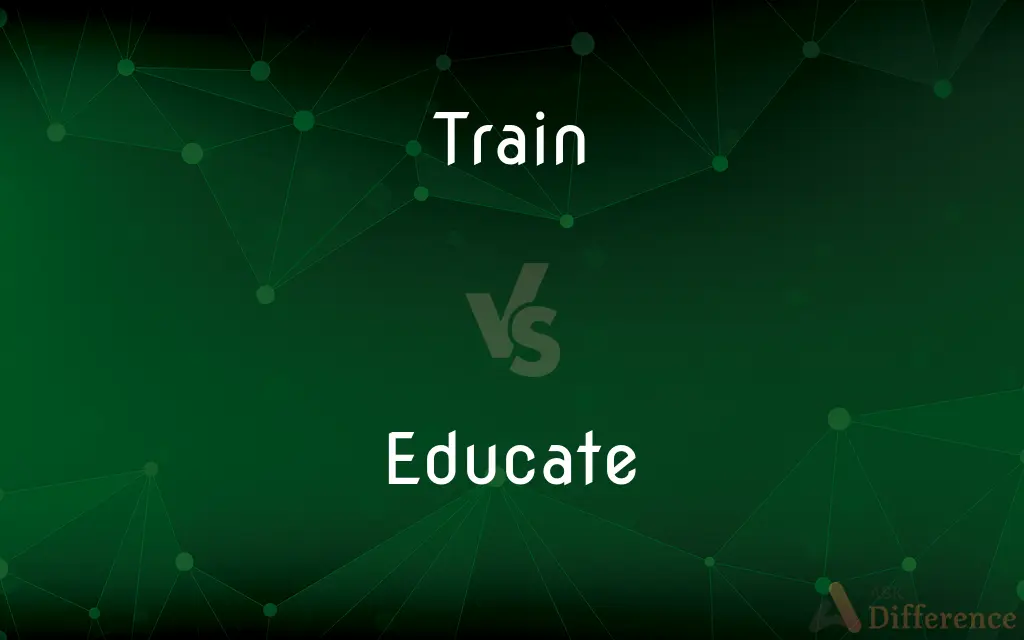Train vs. Educate — What's the Difference?
By Tayyaba Rehman & Maham Liaqat — Updated on April 16, 2024
Training involves teaching specific skills or behaviors through practice and instruction, focused on performing particular tasks, while education encompasses a broader intellectual, moral, and social learning process.

Difference Between Train and Educate
Table of Contents
ADVERTISEMENT
Key Differences
Training is typically task-oriented, aimed at enhancing an individual's ability to perform a specific job or activity through repeated practice and instruction. On the other hand, education is a more comprehensive process that aims to impart knowledge, develop reasoning and judgment, and prepare individuals for a wide range of life's challenges.
While training often has a practical, hands-on approach and is designed to achieve proficiency in specific skills or tasks, education tends to be more theoretical, encouraging a deeper understanding of various subjects and developing critical thinking skills. This distinction highlights how each serves different but complementary purposes.
In terms of duration and depth, training is usually shorter and focuses on immediate and practical application, such as learning to operate machinery or software. Conversely, education is typically a longer, ongoing process that involves exploring a variety of subjects over years, often at educational institutions.
Training is often specific to a particular role or job within a company or an industry, making it highly specialized. Whereas, education covers a broad spectrum of disciplines, providing a more rounded and versatile knowledge base that can be applied in various contexts.
In the context of outcomes, the primary goal of training is to enhance efficiency and productivity, directly impacting job performance. In contrast, the broader objectives of education include personal development, fostering societal understanding, and preparing individuals to make informed decisions in various aspects of life.
ADVERTISEMENT
Comparison Chart
Focus
Specific skills and tasks.
Broad knowledge and personal development.
Approach
Practical and hands-on.
Theoretical and comprehensive.
Duration
Short-term, often for immediate application.
Long-term and continuous.
Scope
Job or role-specific.
Wide-ranging and general.
Outcomes
Job proficiency and productivity.
Intellectual growth and societal preparation.
Compare with Definitions
Train
A practical learning experience focused on specific outcomes.
They underwent customer service training to enhance their interaction skills.
Educate
The process of imparting knowledge and intellectual growth.
The university aims to educate students in both sciences and humanities.
Train
Instruction aimed at achieving proficiency in a particular task.
The apprenticeship included hands-on training in carpentry.
Educate
Instruction that enhances reasoning and critical thinking.
She was educated at a school that emphasized creative problem solving.
Train
Skill development for specific professional roles.
His software training prepared him for the new project management tools.
Educate
The fostering of understanding and informed decision-making.
Part of our mission is to educate the public about environmental conservation.
Train
Preparation for specific challenges in a work setting.
Emergency response training is crucial for safety in factories.
Educate
A broad learning process for moral and social development.
To educate young people effectively, schools must also address ethical issues.
Train
A process to enhance specific skills or behaviors through practice.
She received training in digital marketing to improve her job performance.
Educate
Preparation for a wide range of life’s challenges.
A good education equips you to face diverse situations.
Train
Teach (a person or animal) a particular skill or type of behaviour through sustained practice and instruction
The scheme trains people for promotion
The dogs are trained to sniff out illegal stowaways
Educate
Give intellectual, moral, and social instruction to (someone), typically at a school or university
She was educated at a boarding school
Train
An orderly succession of related events or thoughts; a sequence.
Educate
To develop the mental, moral, or social capabilities of, especially by schooling or instruction.
Train
To coach in or accustom to a mode of behavior or performance.
Educate
To provide with knowledge or training in a particular area or for a particular purpose
Decided to educate herself in foreign languages.
Entered a seminary to be educated for the priesthood.
Train
To make proficient with specialized instruction and practice.
Educate
To provide with information, as in an effort to gain support for a position or to influence behavior
Hoped to educate the voters about the need for increased spending on public schools.
Train
To prepare physically, as with a regimen
Train athletes for track-and-field competition.
Educate
To develop or refine (one's taste or appreciation, for example).
Train
To cause (a plant or one's hair) to take a desired course or shape, as by manipulating.
Educate
To teach or instruct a person or group.
Train
To give or undergo a course of training
Trained daily for the marathon.
Educate
To instruct or train
Educate
To bring up or guide the powers of, as a child; to develop and cultivate, whether physically, mentally, or morally, but more commonly limited to the mental activities or senses; to expand, strengthen, and discipline, as the mind, a faculty, etc.; to form and regulate the principles and character of; to prepare and fit for any calling or business by systematic instruction; to cultivate; to train; to instruct; as, to educate a child; to educate the eye or the taste.
Educate
Give an education to;
We must educate our youngsters better
Educate
Create by training and teaching;
The old master is training world-class violinists
We develop the leaders for the future
Educate
Train to be discriminative in taste or judgment;
Cultivate your musical taste
Train your tastebuds
She is well schooled in poetry
Common Curiosities
Is education always formal?
While often formal, education can also occur informally through self-directed learning, mentoring, and life experiences.
Can training be part of an educational curriculum?
Yes, training can be integrated into educational programs to provide hands-on skills in addition to theoretical knowledge.
How do training and education impact career development?
Training enhances specific job skills, improving immediate job performance, while education provides a foundation for long-term career growth and adaptability.
What is the main difference between training and education?
Training focuses on specific skills for practical application, while education provides a broader intellectual and moral understanding.
Why is continuous education important in a professional setting?
Continuous education helps individuals keep up with industry changes and technological advancements, maintaining their relevance in the job market.
Is on-the-job training a form of education?
On-the-job training is a specific type of training that combines elements of education by providing practical skills within the context of employment.
What role does technology play in training and education?
Technology facilitates both training and education by providing accessible, diverse, and interactive learning tools and resources.
How can training be customized for different learning styles?
Training can be adapted to different learning styles through varied instructional methods such as visual aids, hands-on practice, or interactive simulations.
Which is more beneficial, training or education?
Both are beneficial and often necessary; the choice depends on individual career goals and the specific requirements of their profession.
What is the role of an educator versus a trainer?
Educators focus on imparting broad knowledge and fostering critical thinking, while trainers aim to develop specific skills and task proficiency.
What are the societal benefits of widespread education?
Widespread education fosters a more informed, ethical, and productive society, enhancing overall quality of life.
How do different cultures view training and education?
Cultural values influence the emphasis placed on practical training versus broader educational goals, affecting how learning systems are structured.
Can education prepare you for specific jobs?
Yes, education can prepare individuals for specific jobs, especially when it includes relevant training components or specialized courses.
How do online platforms influence training and education?
Online platforms expand access to both training and education, making learning more flexible, diverse, and accessible to a global audience.
How do personal interests influence education and training choices?
Personal interests guide individuals towards specific educational paths and training opportunities, shaping their career and personal development.
Share Your Discovery

Previous Comparison
Soapie vs. Telenovela
Next Comparison
Hellbender vs. MudpuppyAuthor Spotlight
Written by
Tayyaba RehmanTayyaba Rehman is a distinguished writer, currently serving as a primary contributor to askdifference.com. As a researcher in semantics and etymology, Tayyaba's passion for the complexity of languages and their distinctions has found a perfect home on the platform. Tayyaba delves into the intricacies of language, distinguishing between commonly confused words and phrases, thereby providing clarity for readers worldwide.
Co-written by
Maham Liaqat















































